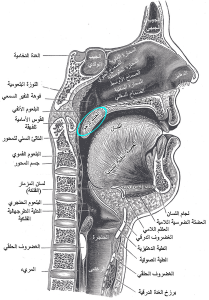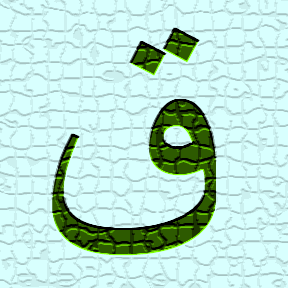Somewhere over at the forums a question came up about how exactly to pronounce Dothraki Q. It’s a favorite sound of mine, so I thought it’d be nice to dedicate a post to it.
I first encountered the sound which in IPA is transliterated as [q] in 1999, when I took my first Arabic class at Berkeley. I’d previously known the character (the letter qaaf, which looks like this: ق), but the descriptions I found were probably worse than useless (many tried to compare it to “qu” in English, which makes absolutely no sense). Since I knew it was a sound completely foreign to English and had nothing but terrible descriptions, I went into my first class assuming the sound was going to be incredibly difficult. As a result, I made it more difficult by (I now realize) geminating the sound in all positions (which was quite difficult in initial position).
The sound is actually as easy to produce as a [k]; it just makes the vowels around it harder to produce. It’s also harder to produce clusters like [qr] and [ql] because your tongue has to stretch further forward after the closure. But the stop itself is no big deal. Here’s how you do it.
The best place to start is to look at the consonant [k] (like in English “bike”). To form a [k], you take the back of your tongue and form a closure by placing it against the soft palate. Here’s what that area looks like on a human:

To make a closure at the uvula, all you do is bunch up the back of your tongue and move it further backward along the soft palate. Here’s that area circled on the same image:

If you do it right, it should produce a kind of hollow sound that, to me, sounds like a drop of water. [Heh. It’s funny. I was just talking to Jeff Jones about how we often use vague descriptions to describe sounds. Guess I’m guilty of it too!]
Anyway, the best I can do is produce some audio of some Dothraki words and phrases using Q—and contrasting it with K, so you can hear the difference.
Here’s me pronouncing kafat, “to smash” and qafat, “to ask”:
Now to put it in medial position, here’s hake, “name” and haqe, “tired”:
And here it is as a geminate in the phrase coined by George R. R. Martin jaqqa rhan:
You’ll probably notice that the vowels following Q sound a little different from the vowels following K. This is quite common (though not obligatory) in natural languages that have [q] (or other uvular consonants). Here’s a table showing how a Dothraki vowel will sound when it follows K and how it’ll sound when it follows Q:
| Vowel Phoneme | Sound Following K | Sound Following Q |
|---|---|---|
| A | [a] | [ɑ] |
| E | [e] | [ɛ] |
| I | [i] | [e] |
| O | [o]* | [ɔ] |
* Actually the pronunciation of O even in ordinary situations varies a little bit. Sometimes it will come out as [u] after a velar consonant like K, G or KH.
Now that you know how it sounds and how to produce it theoretically, why not give it a shot? If you’ve got recording equipment, give these words/phrases a try, and e-mail the files to “dave” at “dothraki” dot “com”. If I get some sound files, I’ll put them up in a new blog post (unless you don’t want me to, in which case let me know!), and I’ll tell you how you did. It’s just for fun, so don’t feel pressured to get it perfect: Just give it a shot!
Here are some phrases to try:
- Qoy qoyi. “Blood of my blood.”
- Hake mae “Haqe”. “His name is ‘Tired’.”
- Kisha dothraki yomme qeshah. “We ride across the sand.”
And here’s a tongue twister for fun:
- Qafak qov kaffe qif qiya fini kaf faqqies fakaya. “The trembling questioner crushed the bleeding boar that squished a kicking corn bunting.”
What’s a corn bunting, you ask? Why, a bird, of course. Can I pronounce that sentence…? Well, if you give it a shot, I will too—and I’ll post the unedited, first-try recording here on the blog.
Good luck!

When you pronounce “Jaqqa rhan” it sounds like the /a/ in “rhan” is pronounced more like [ɛ]. Is that really how it’s pronounced or is that a mistake on your part?
Also I think you stated that the term “jaqqa rhan” which is the books is translated as “mercy men” isn’t a literal translation. So what is the literal meaning of “jaqqa” and “rhan”?
It’s probably a trick of the ears. I was going for [a] but might’ve realized it as [æ] (which will happen sometimes). [æ] can often be misheard as [ɛ]. In fact, it might’ve been due to the presence of a coda nasal which can cause raising.
Also I think you stated that the term “jaqqa rhan” which is the books is translated as “mercy men” isn’t a literal translation. So what is the literal meaning of “jaqqa” and “rhan”?
It’s actually not too different. It translates to “mercy executioner”, with jaqqat being a word meaning something like “execute” (i.e. to kill, but only in an official capacity).
Am I correct to assume that if you had created the word for executioner rather than Martin then it would have been “jaqqak” rather than “jaqqa”?
No, not necessarily. A language is a living, breathing thing; you can’t predict it. For example, someone who cooks food in English is a “cook”, not a “cooker”. I liked this idea (where jaqqa is actually an inanimate noun of class B), because it makes the jaqqa less animate: more of an instrument of destruction.
“qife” in “Qafak qov kaffe qife qiya fini kaf faqqies fakaya.” Shouldn’t that be in accusative? And if so shouldn’t it be “qif” or “qifees” instead?
Oh, ha, ha. I misread that as Class B (which seemed odd, but I was willing to go with it). Oops! Looks like you win the Qvaak award this week!
Hi David!
I was wondering, how is the rh in rhan supposed to be pronounced exactly? I couldn’t find it in the phonology description in the Dothraki wiki.
Is it like Spanish R in the beginning of words and medially as rr? Or like Welsh rh? or Icelandic hr?
It’s pronounced as a consonant cluster: [ɾh]. The tap will, naturally, devoice as a result of contact with [h], but otherwise it’s just an ordinary tap.
All of this raises a question I’ve been meaning to ask for some time: In setting up the Dothraki sound system, how did you decide how the original words that appear in the books were supposed to be pronounced? As I recall, Martin doesn’t give a pronunciation guide in the books.
For example, is it known that Martin intended “q” to be a uvular sound, or is that your interpretation? Also, how did you determine/decide that “th” and “kh” would represent fricatives, rather than, say, aspirated stops?
GRRM’s stated several times that he doesn’t care how people pronounce the names/words in his books (he says he’s not a “language guy”). So it was up to me to figure out how things either could or should be pronounced.
For the most part, I tried to do what the average English-speaking reader would expect—and, for the most part, this turned out to be close to GRRM’s actual pronunciation. It wasn’t 100% (for example he pronounces “Dothraki” [do.θɹɑ.ˈkaj]), but it was about 90%.
I was pretty sure that “th” was intended to be [θ], since that’s what most English-speakers would expect, so I went with that. I then analogized from that to turn “kh” into [x]. As for “q”, it needed to be (or could be) something different from “k”, and since there are words in Dothraki that have “qu” (clearly supposed to be [kw]), the ones that have just plain “q” should probably different from the realization of “qu”.
And, since I like [q], I thought, “Why not?”